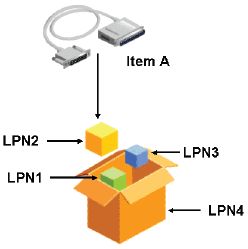WMS LPN(License Plate Number)
LPN(License Plate Number) is an object carries the location where it is residing and items that are holding. LPN need not be a physical object, it could be logical grouping. LPN simpley a group of items represented systematically. The major advantage of LPN is less number of transactions. Entire LPN can be transacted at once instead of by each line that LPN holds.
In a word,A LPN allows you to logically group items together that physically travel together on the floor.
All material received through Oracle Warehouse Management is associated with a unique LPN.
This enables material to easily be tracked and transacted throughout your warehouse without scanning the item, quantities, lots or serial numbers. (There is a good example,see here)
A Corresponding Concept
Packed Items(LPN) <--> Loose Material(Non-LPN)
In Oracle Mobile,All transactions can be for either loose material or LPN triggered.
LPN triggered transactions require less data entry because an LPN has its current subinventory, location, and item contents all associated with a single identifier.
The benefit of an LPN triggered transaction is greater when it contains serial controlled items because the amount of data entry is greater.
Using LPNs
Oracle Warehouse Management enables you to track, transact, and nest LPNs.
- Store information about an LPN such as item, revision, lot, serial, organization, subinventory, or locator
- Track contents of any container in receiving, inventory, or in-transit
- Receive, store, and pick material by LPN
- View on hand balances by LPN
- Move multiple items in a transaction by LPN
- Transfer LPN contents
- Pack, unpack, consolidate, split, and update LPNs
- Print labels and reports for referencing container contents
- Track nested LPNs Oracle Internal & OAI Use OnlyOracle Only
- Reuse empty LPNs
- Receive and send LPN information on an ASN
Nesting License Plate Numbers
Oracle Warehouse Management enables you to nest LPNs.
For example, pallet LPN P5555 contains three nested LPNs: LPN P5552, LPN P5553, and LPN P5554. In the system, you would see LPN P5555 as the top-level LPN, and each of the of the three box LPNs would fall under LPN P5555.
You can nest LPNs within other LPNs. In the above example, item A is packed in LPN 2, and LPN1, LPN2, and LPN3 are nested within LPN4. When you transact LPN4, all of the LPNs nested within it are transacted.
LPN Transactions(refer)
LPN transactions allow movement of material in to and out of LPNs and enable you to manually create nested LPNs. The available LPN Transactions are as follows:
Pack transaction- The Pack transaction enables you to pack loose material into an LPN.
Consolidate transaction- The Consolidate transaction enables you to nest a child LPN inside a parent LPN.
Unpack transaction- The Unpack transaction enables you to unpack either material or a nested LPN from a parent LPN.
Split transaction- The Split transaction is essentially an Unpack and Pack combined together, creating a new LPN with some material from another LPN.
Update LPN transaction- The Update LPN transaction enables you to update the weight, volume, and container item of an LPN. As in all other transactions, LPN transactions of lot, serial, or revision controlled material requires you to enter the item controls.
Relationship between Some LPN Related Tables
Meaning of LPN Context Code(refer)
Oracle Warehouse Management system (WMS) defines a context for each LPN to denote the current state of the LPN. Some of these contexts can be used in the WMS Rules Engine to define specialized picking and put away rules.
| LPN Context Value | Description |
|---|---|
| 1 | Resides in Inventory |
| 2 | Resides in WIP |
| 3 | Resides in Receiving |
| 4 | Resides in Stores |
| 5 | Pre-generated |
| 6 | Resides in Intransit |
| 7 | Resides in Vendor Site |
| 8 | Packing context, used as a temporary context value |
| 9 | Loaded for shipment |
| 10 | Prepack of WIP |
| 11 | Picked |
Reference: http://www.oracleug.com/user-guide/warehouse-management/license-plate-numbers-lpns

